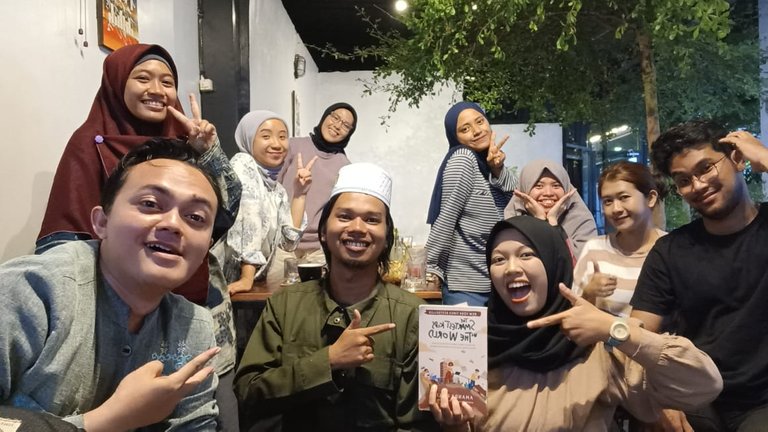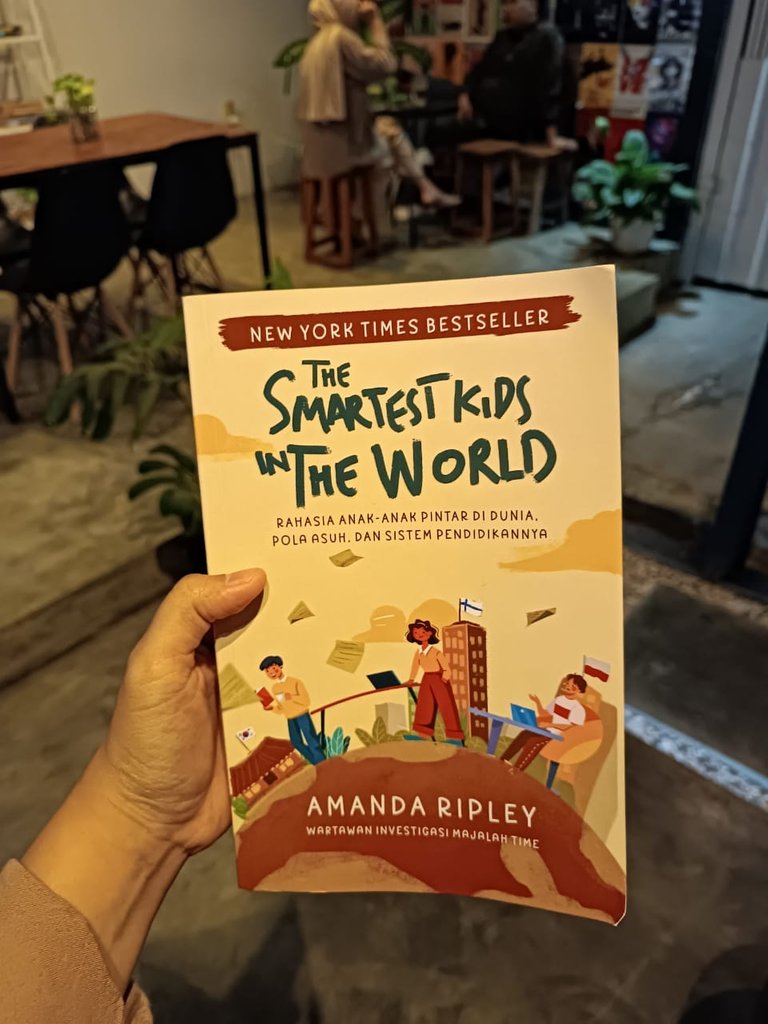I hold that education could be considered a failure when a farmer's child no longer wants to farm, and a fisherman's child stops going to the ocean.
I had shown this narrative during the 58th discussion, dissecting Amanda Ripley's book The Smartest Kids in the World: And How They Got That Way, on Monday, July 17, 2023, at Kineta Coffee & Public Sphere, hand in glove with the Klub Buku Main-Main.

In the Indonesian edition, an additional clickbait subheading says, Rahasia Anak-Anak Pintar di Dunia, Pola Asuh, dan Sistem Pendidikannya (Secrets of Smart Kids in the World, Parenting Patterns, and Educational Systems).
This title is enticing and makes me not wanna miss this discussion.

Among other things, due I am at this moment studying effective educational methods as I am applying for a scholarship to serve in outlying areas in Indonesia.
In my word, translating and How They Got That Way into Rahasia Anak-Anak Pintar di Dunia, Pola Asuh, dan Sistem Pendidikannya doesn't properly reflect the content of the book.
This would be suitable only if it is aimed at making readers more curious, enticing them to buy (a business strategy).
In the Klub Buku Main-Main, we even frequently dissect books and criticize them if we assume they warrant criticism.
Despite the Main-Main acronym, we ain't always lighthearted; we primarily focus on discussing which books are worth reading and vice versa in a serious manner.
This book was written by Amanda Ripley, an investigative journalist known for her work in various media outlets such as Time, The Atlantic, and several other prestigious magazines.
As a matter of fact being a journalist, Amanda's writing is highly satisfying for people like me who appreciate investigative reports.
Moreover, Amanda has the ability to present her work with a literary journalism approach, as I mentioned in my previous article. This makes her writing even more engaging and lovely to read.
Due to that, I made a deal with Luluh Pramudaningtyas, the mouthpiece initiator of this event. This book is relevant for reading by teachers, parents, or anyone interested in the development of educational quality.
Amanda elaborates on the comparison of the education system in the United States with the education systems in countries known as educational the best one, that is to say, Finland, South Korea, and Poland.
The most noticeable difference between schools in the United States and Finland is the presence of high-tech equipment to support the teaching and learning process.
While the United States schools be able to appear to have more comprehensive facilities, Finland boasts the highest intelligence levels in the world.
One of the reasons for this is that education is heavily influenced by the quality of its teachers.
In Finland, the teaching profession is awfully respected, both financially and socially. Not everyone could be in the teacher education program as it is deeply selective, making teaching a prestigious occupation in the country.
This doesn't happen in the United States, and even in Indonesia. When discussing teacher salaries, it often gets linked to the afterlife to justify the low wages of teachers.
However, as Amanda mentioned, the quality of the education system cannot surpass the quality of its teachers.
So, how come we've quality teachers if they are only paid $50 for honorary teachers a month like in Indonesia?
Undoubtedly, in South Korea, the success of education is driven by the presence of hagwons, which are private learning institutions or academies. In Indonesia, they are known as Bimbel, an acronym for bimbingan belajar (private tutoring).
In Korea, schools as a rule start from 8 in the morning and continue until 9 at night. After that, students will continue studying in hagwons until 11 at night.
Meanwhile, the initial transformation of the Polish education system focused on curriculum development within schools.
Unlike in the United States, where the curriculum is adapted to students' abilities, the Polish curriculum is continually enhanced to meet international standards.
Parents in Poland believe that it is better for their children to experience failure and mistakes during their school years rather than face them later in their professional lives.
Students in Poland as well recognize this perspective, so poor grades or exam failures do not discourage them from continuing their learning journey.
In the opinion, Amanda, to assess whether a school is good or not, several factors should be considered.
These factors include the school's ability to inspire students' desire to learn, weaknesses observed based on feedback from other parents, and how the school maintains its quality.
These aspects play a crucial role in evaluating the effectiveness and overall performance of a school.
What is more, in this book discussion, we've taken note that the indicators used to measure the level of literacy and numeracy in a country are based on the results of the Programme for International Student Assessment (PISA) initiated by the Organisation for Economic Co-operation and Development (OECD).
PISA is used to compare students' performance in literacy, mathematics, and science across different countries.
However, there is an aspect that PISA overlooks, which is Indigenous knowledge or local wisdom unique to each country.
Although the curricula in the United States, Finland, South Korea, and Poland are considered among the best today, they may not be suitable for every country, especially Indonesia, which comprises 1,340 ethnic groups with diverse cultural backgrounds and environmental conditions.
I am into what Gafur Pratama (Aponk) presented, where Indonesia has one of its educational offerings, called Pondok Pesantren (school of Koranic studies for children and young people, most of whom are boarders) or an Islamic boarding school.
Pondok Pesantren holds a stronger appeal due it not only teaches students in the realm of IQ (Intelligence Quotient) related to cognitive abilities but as well focuses on EQ (Emotional Quotient) to measure emotional intelligence and social intelligence.
By emphasizing SQ (Spiritual Quotient), which is closely related to spiritual intelligence, Pondok Pesantren recognizes the importance of social and spiritual intelligence. These aspects are often not emphasized in international schools with reputedly the best curricula in the world.
Last but not least, if educational institutions only measure a person's intelligence based on the Intelligence Quotient, then humans may lose out to artificial intelligence, which is soon expected to replace many human roles.
It is crucial for educational systems to recognize and develop the full range of human intelligence, including emotional, social, and spiritual intelligence, to thrive in an ever-changing world [mhg].